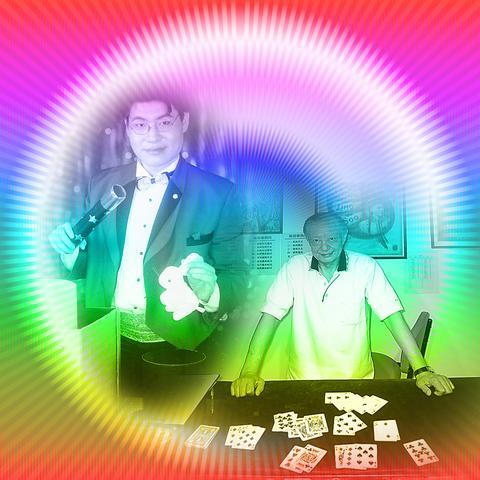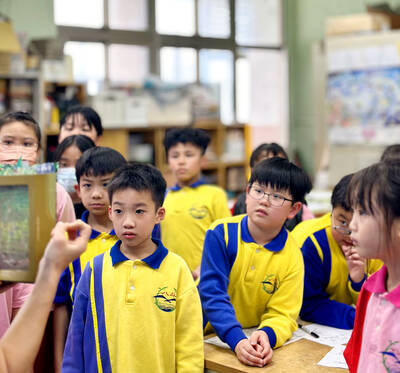While some may find David Blaine and his attention-getting stunts rather annoying and less than magical, the American has conjured up great success. So much so, that while local TV stations have yet to jump on the bandwagon, local magicians are looking to do outdoor and corporate sponsored magic shows and taking to the streets in an attempt to keep their magic arts alive.
A combination of state-of-the-art developments within the leisure industry and the economic slump have led to a decline in business over the past half-decade and Taiwan's dozen professional magicians are finding that audiences are disappearing faster than they can say abracadabra.

PHOTO COURTESY OF KITSCH PROMO PHOTO AND GAVIN PHIPPS, TAIPEI TI
Until as recently as five years ago, grandiose magic shows were hugely popular. Many of the nation's theme parks employed full time magicians and shows were plentiful. Well-known magicians commanded appearance fees ranging from NT$10,000 to upwards of NT$30,000 for a single performance. Now, according to illusionist Chen Kuan-lin (
"There was a time when I was doing three or four shows a night," said Taiwan's best-known magician, Chia Ke-li (
"It all changed following the 921 earthquake. The economy went down hill and people stopped visiting the theme parks I used to perform at. The grandiose magic show seemed to die overnight."
In a magic career that spanned almost five decades, Chia and his Magicfantastic troupe not only captivated audiences in Taiwan, but also toured the globe. They performed to packed houses in Malaysia, Singapore, Japan, Thailand, Korea, Philippines and even the US, where in the late 1970s Chia and his troupe were featured in the New York Times.
While Chia performed his greatest tricks -- including catching a flying bullet with a piece of string -- on large stages with props and assistants, the staging of such shows, however breathtakingly spectacular, is no longer possible. Recuperating the cost of staging a noteworthy large-scale magic show is now unfeasible and sponsorship for such a venture is even harder to find, according to the celebrated illusionist.
"It can't be done anymore. In fact, when I look back and remember the illusions I have performed over the years, very few could be repeated simply because of the costs involved," Chia said. "Getting a backer is now even more difficult as nobody is going to want to sponsor an illusion, such as catching a bullet or making a building disappear that takes five minutes."
The decline in the number of venues now willing to book a magician because of the high costs of staging such grand illusions has led to a change in the way in which those in the magic community work. Local magicians now look to cheaper, fast hitting and in-your-face street magic as opposed to grand illusions.
"I still do the occasional, very occasional, large gig, but because they don't attract the numbers they used to I've taken to performing outside during the weekends and public holidays," said Fang Yuan-shih (
Like Chia, Fang initially made a name for himself performing at theme parks around the country. His biggest worry at the time was not low audience figures, but discovering that under the heat of the stage lighting the live animals he was using would become dizzy and instead of jumping out of a hat they would lie motionless.
When the Taipei City Government's Cultural Affairs Bureau (
"The reaction you get in parks and public spaces in Taipei can be somewhat muted. People often think you're slightly unbalanced and wonder what you're up to," Fang said. "But at Dansui during the weekends, people are really into what I'm doing. Whether it's a simple card trick, toying around with coins or making someone's mobile phone disappear, people view it all as good-natured fun."
Taiwan's younger generation of magicians may believe street and public magic are where the future lies, but Chia views things slightly differently. According to the eminent magician, such illusions are "tomfoolery" and not real magic at all.
"I don't consider what many call street magic to be real magic. Small tricks haven't got the same feel as large illusions," Chia said. "Such tricks might impress people for a minute or two, but I don't think that these street-magic performances will lead to a resurgence in the popularity of magic shows. In fact, I think quite the opposite will happen, people will, over a period of time, simply become bored with they whole thing."
Although aware that the staging of large-scale illusions is now all but a dream for Taiwan's magicians, Fang does still has one lofty idea for a future breathtaking illusion.
"Along with wanting to make my neighbors noisy dog disappear I'd like to make the Taipei 101 disappear someday," Fang said. "It would be costly, but I figure that such an illusion is viable and would certainly grab people's attention."
Fang may be happy to ply his street magic in Dansui, but magicians such as Chen are finding such performances rather lackluster. Over the past couple of years Chen has built a name for himself in the corporate world instead.
Though he readily admits performing corporate promotional magic shows on street corners was not quite what he envisioned when he set out to become a magician, Chen is aware that such shows are the only way in which he can earn a living.
"Sure we've got huge auditoriums that can seat thousands, but nobody wants to take the risk of booking a magician," he said. "David Copperfield might pack them in when he plays here, but a local magician would never receive the same media attention or backing, however good they were."
Along with helping to promote new products by companies such as Panasonic, Hennessy and Lancome, Chen has also taken to mingling with the stars and helping to using his magic to promote record releases. Recently, his most prominent gig was when Chen made local pop icon, Gigi (
Street corners and corporate deals do not appeal to all of Taiwan's magicians, however. For magician P.J. Wen (
"Sure, I've done my fare share of corporate gigs for money, but I don't get much satisfaction from making a BMW appear and disappear. Illusions like this are not as personal as they are for someone else," Wen said. "To escape the drudgery of doing this I've taken to traveling abroad a lot and performing at international competitions."
Of all the places he's performed, however, Chen believes that it is China that holds the key to the future of magic in the east. Along with the government funding of magic classes and schools, one of China's TV stations has recently begun airing a localized Blaine-styled TV show on which local magicians roam the streets and astonish the populace in front of the camera.
"China has a TV show which showcases young magicians and films them as they do street magic. It's a pretty good show and the level of the tricks is quite high," he said. "It's watched by millions of people. I mean, what better way to promote magic could you get?"
With the exception of brief appearances on variety shows and the odd news feature, local magicians are pretty much ignored by the local media, which is something that magicians such as Wen consider rather shortsighted.
"David Blaine's shows are popular here and I think Taiwan could definitely learn from this way of promoting magic," Wen said. "I'm positive a program like this with local magicians would prove a hit, especially if one of them performs a truly spectacular illusion."
Taiwan's grandmaster of magic remains skeptical, however, about the feasibility of Copperfield-like illusions such as making the Taipei 101 disappear. In fact, Chia has only two words for anybody foolhardy enough to attempt it. "Impossible. Bullshit."

May 26 to June 1 When the Qing Dynasty first took control over many parts of Taiwan in 1684, it roughly continued the Kingdom of Tungning’s administrative borders (see below), setting up one prefecture and three counties. The actual area of control covered today’s Chiayi, Tainan and Kaohsiung. The administrative center was in Taiwan Prefecture, in today’s Tainan. But as Han settlement expanded and due to rebellions and other international incidents, the administrative units became more complex. By the time Taiwan became a province of the Qing in 1887, there were three prefectures, eleven counties, three subprefectures and one directly-administered prefecture, with

It’s an enormous dome of colorful glass, something between the Sistine Chapel and a Marc Chagall fresco. And yet, it’s just a subway station. Formosa Boulevard is the heart of Kaohsiung’s mass transit system. In metro terms, it’s modest: the only transfer station in a network with just two lines. But it’s a landmark nonetheless: a civic space that serves as much more than a point of transit. On a hot Sunday, the corridors and vast halls are filled with a market selling everything from second-hand clothes to toys and house decorations. It’s just one of the many events the station hosts,

Two moves show Taichung Mayor Lu Shiow-yen (盧秀燕) is gunning for Chinese Nationalist Party (KMT) party chair and the 2028 presidential election. Technically, these are not yet “officially” official, but by the rules of Taiwan politics, she is now on the dance floor. Earlier this month Lu confirmed in an interview in Japan’s Nikkei that she was considering running for KMT chair. This is not new news, but according to reports from her camp she previously was still considering the case for and against running. By choosing a respected, international news outlet, she declared it to the world. While the outside world

Through art and storytelling, La Benida Hui empowers children to become environmental heroes, using everything from SpongeBob to microorganisms to reimagine their relationship with nature. “I tell the students that they have superpowers. It needs to be emphasized that their choices can make a difference,” says Hui, an environmental artist and education specialist. For her second year as Badou Elementary’s artist in residence, Hui leads creative lessons on environmental protection, where students reflect on their relationship with nature and transform beach waste into artworks. Standing in lush green hills overlooking the ocean with land extending into the intertidal zone, the school in Keelung